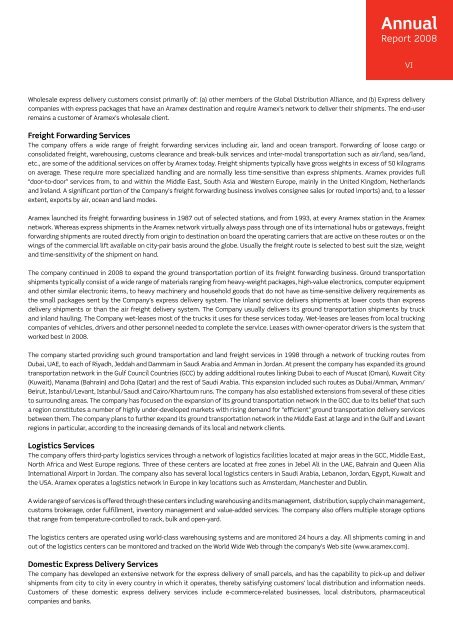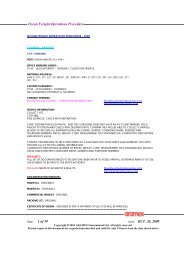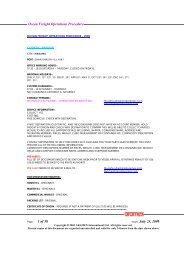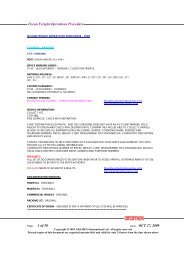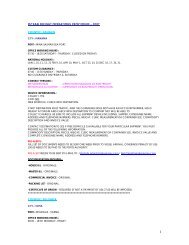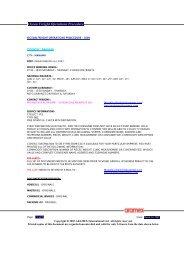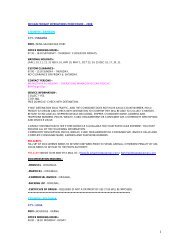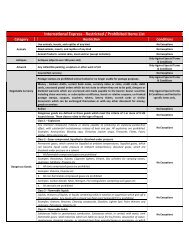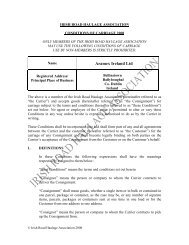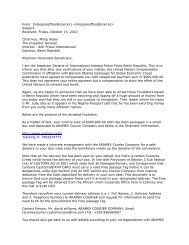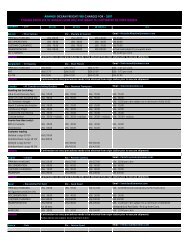Annual - Aramex
Annual - Aramex
Annual - Aramex
You also want an ePaper? Increase the reach of your titles
YUMPU automatically turns print PDFs into web optimized ePapers that Google loves.
<strong>Annual</strong><br />
Report 2008<br />
Wholesale express delivery customers consist primarily of: (a) other members of the Global Distribution Alliance, and (b) Express delivery<br />
companies with express packages that have an <strong>Aramex</strong> destination and require <strong>Aramex</strong>’s network to deliver their shipments. The end-user<br />
remains a customer of <strong>Aramex</strong>’s wholesale client.<br />
Freight Forwarding Services<br />
The company offers a wide range of freight forwarding services including air, land and ocean transport. Forwarding of loose cargo or<br />
consolidated freight, warehousing, customs clearance and break-bulk services and inter-modal transportation such as air/land, sea/land,<br />
etc., are some of the additional services on offer by <strong>Aramex</strong> today. Freight shipments typically have gross weights in excess of 50 kilograms<br />
on average. These require more specialized handling and are normally less time-sensitive than express shipments. <strong>Aramex</strong> provides full<br />
“door-to-door” services from, to and within the Middle East, South Asia and Western Europe, mainly in the United Kingdom, Netherlands<br />
and Ireland. A significant portion of the Company’s freight forwarding business involves consignee sales (or routed imports) and, to a lesser<br />
extent, exports by air, ocean and land modes.<br />
<strong>Aramex</strong> launched its freight forwarding business in 1987 out of selected stations, and from 1993, at every <strong>Aramex</strong> station in the <strong>Aramex</strong><br />
network. Whereas express shipments in the <strong>Aramex</strong> network virtually always pass through one of its international hubs or gateways, freight<br />
forwarding shipments are routed directly from origin to destination on board the operating carriers that are active on these routes or on the<br />
wings of the commercial lift available on city-pair basis around the globe. Usually the freight route is selected to best suit the size, weight<br />
and time-sensitivity of the shipment on hand.<br />
The company continued in 2008 to expand the ground transportation portion of its freight forwarding business. Ground transportation<br />
shipments typically consist of a wide range of materials ranging from heavy-weight packages, high-value electronics, computer equipment<br />
and other similar electronic items, to heavy machinery and household goods that do not have as time-sensitive delivery requirements as<br />
the small packages sent by the Company’s express delivery system. The inland service delivers shipments at lower costs than express<br />
delivery shipments or than the air freight delivery system. The Company usually delivers its ground transportation shipments by truck<br />
and inland hauling. The Company wet-leases most of the trucks it uses for these services today. Wet-leases are leases from local trucking<br />
companies of vehicles, drivers and other personnel needed to complete the service. Leases with owner-operator drivers is the system that<br />
worked best in 2008.<br />
The company started providing such ground transportation and land freight services in 1998 through a network of trucking routes from<br />
Dubai, UAE, to each of Riyadh, Jeddah and Dammam in Saudi Arabia and Amman in Jordan. At present the company has expanded its ground<br />
transportation network in the Gulf Council Countries (GCC) by adding additional routes linking Dubai to each of Muscat (Oman), Kuwait City<br />
(Kuwait), Manama (Bahrain) and Doha (Qatar) and the rest of Saudi Arabia. This expansion included such routes as Dubai/Amman, Amman/<br />
Beirut, Istanbul/Levant, Istanbul/Saudi and Cairo/Khartoum runs. The company has also established extensions from several of these cities<br />
to surrounding areas. The company has focused on the expansion of its ground transportation network in the GCC due to its belief that such<br />
a region constitutes a number of highly under-developed markets with rising demand for “efficient” ground transportation delivery services<br />
between them. The company plans to further expand its ground transportation network in the Middle East at large and in the Gulf and Levant<br />
regions in particular, according to the increasing demands of its local and network clients.<br />
Logistics Services<br />
The company offers third-party logistics services through a network of logistics facilities located at major areas in the GCC, Middle East,<br />
North Africa and West Europe regions. Three of these centers are located at free zones in Jebel Ali in the UAE, Bahrain and Queen Alia<br />
International Airport in Jordan. The company also has several local logistics centers in Saudi Arabia, Lebanon, Jordan, Egypt, Kuwait and<br />
the USA. <strong>Aramex</strong> operates a logistics network in Europe in key locations such as Amsterdam, Manchester and Dublin.<br />
A wide range of services is offered through these centers including warehousing and its management, distribution, supply chain management,<br />
customs brokerage, order fulfillment, inventory management and value-added services. The company also offers multiple storage options<br />
that range from temperature-controlled to rack, bulk and open-yard.<br />
The logistics centers are operated using world-class warehousing systems and are monitored 24 hours a day. All shipments coming in and<br />
out of the logistics centers can be monitored and tracked on the World Wide Web through the company’s Web site (www.aramex.com).<br />
Domestic Express Delivery Services<br />
The company has developed an extensive network for the express delivery of small parcels, and has the capability to pick-up and deliver<br />
shipments from city to city in every country in which it operates, thereby satisfying customers’ local distribution and information needs.<br />
Customers of these domestic express delivery services include e-commerce-related businesses, local distributors, pharmaceutical<br />
companies and banks.<br />
VI


